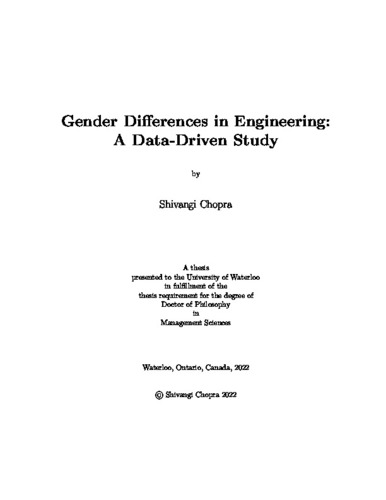| dc.description.abstract | The gender gap in Science, Technology, Engineering, and Mathematics (STEM) is well known. Not only do fewer women apply to and earn engineering degrees, but also more women leave engineering programs and careers. Past studies have identified various reasons that affect female students' decisions to join engineering programs. Some of them include STEM interest, access to role models, and high school context. Further, labour market studies, which focus on later career stages, have found workplace experiences of engineering graduates to differ based on gender and drive female attrition. While the majority of studies on STEM recruitment are qualitative in nature or are based on small datasets collected using surveys and interviews, this thesis takes a data-driven approach towards studying gender differences in engineering. Moreover, since early career experiences can greatly affect subsequent career choices, this thesis investigates gender differences in early engineering careers, specifically in the co-operative education (co-op) form of work-integrated learning.
Our analysis is enabled by unique datasets from a large North American university with renowned engineering programs and mandatory co-op. We use standard statistical and text analysis tools to measure gender differences in (a) motivations, interests, and backgrounds of 33,763 applicants, and (b) co-op work experiences of 8,956 students in terms of their choices, opportunities, evaluations, and satisfaction. The goal of this thesis is to quantify the gender gap in engineering and provide data-driven insights into closing it.
While analyzing students' motivations behind joining co-op engineering programs, we find that female applicants are more likely to mention personal influences, a desire to contribute to society, and access to real-world work experiences. In addition, the unique characteristics of high schools that produce more female engineering applicants include: a) on average, female students from these schools outperform male students on standardized math tests, and b) applicants from these schools report more personal influence and a wider variety of interests, encompassing technology, arts, community, and travel. However, these applicants participate in fewer collaborative and competitive STEM activities.
Our analysis of students' co-op experiences shows that female students tend to apply to and fill slightly different positions than male students. While male and female students appear equally likely to obtain interviews and secure placements, female students seem to take more risks when ranking potential job opportunities and receive slightly higher performance appraisals. Nevertheless, male students appear to be perceived as more agentic and are more satisfied than female students from the very beginning of their careers.
The data-driven findings presented in this thesis may encourage female students to apply to engineering, as well as provide actionable insights to academic institutions and employers wishing to diversify their talent pool. | en |

